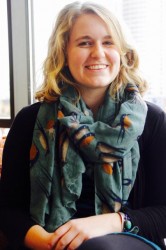Nuns and Nones: Conversation at intersection of contemporary religious, secular life
Local Dominican Sisters and Millennial Nones met in an inter-generational space which lead to conversations about how to sustain ourselves for decades in movements for social justice, how to stay connected with one another in a technological world that has potential for isolation, and so much more.

A few months ago, I wrote two articles on the trend in American religious life that has been dubbed by Pew Research as “the Rise of the ‘Nones.’” This language of the “Nones” is an umbrella term meant to include anyone who falls into a “none of the above” situation when filling out demographic information about their religious tradition. Including atheists, agnostics, and “nothing in particular,” according to recent surveys the Nones now account for the second largest religious group in America, resulting in roughly one in four overall, and one in three millennials. (Source)
My first article explored how many of these Nones are building meaningful communities outside of religious institutions, and the second article suggested what religious institutions and Nones might be able to learn from one another.
As a so-called None myself, I was interested to see how religious leaders in our city would respond to these pieces. To my delight, a Dominican Sister emailed to let me know how she appreciated the perspective and wanted to learn more about and from the Nones.
When we sat down and talked, the similarities between her group, the Nuns, and my group, the Nones, became so obvious. Both Nuns and Nones are on the margins or fringes of our traditions. Both Nuns and Nones have a track record of challenging institutions in order to promote inclusion and justice. Both Nuns and Nones are seeking community that is open to questions and the continuous search for meaning.
From my own one-on-one relationships with Catholic Nuns, and particularly the Dominican Sisters, I knew how much there would be for us to learn from each other. Based in our shared values, this inter-generational space would lead to conversations about how to sustain ourselves for decades in movements for social justice, how to stay connected with one another in a technological world that has the potential for isolation, and so much more.
Knowing how many Millennial Nones like myself desire spaces to learn from those who came before us, and realizing how older women who are religious desire spaces to connect with younger generations and their energetic engagement with the world around them, we set the first time and place to gather the Nuns and the Nones.
This past weekend, 17 of us came together – a balance between older women who are religious, millennial who are non-religious, and those in between – generationally and religiously.
We talked about the potential limitation or spaciousness of labels and identities. We talked about how questions never go away – but only deepen and gain meaning with age. We talked about how while many of us were taught that religion is black and white, spirituality can be that space in between meant for searching and discovery. We talked about the “deepest questions and unanswered wonderings” of our lives. We asked each other how we “fit” as a human family, how we feed ourselves in sustaining our activism, and what we are looking for in community. We talked about the difference between the community of church and the institution of church, the horizontal and the vertical. We talked about how we seek validation that it is okay to ask and seek, and we received that validation from one another. We were reminded to believe in one another, be okay with failure, look at the long view of history, and that perfect can be the enemy of good.
The words we closed with were ones of renewal, hope, inspiration, gratefulness, generosity, belonging, and whatever the opposite of mansplaining is (maybe womanspiration?).
What excites me most about this gathering is what it indicates beyond Grand Rapids, and beyond the Nuns and the Nones. Similar gatherings to this one are happening across the country, which also grew out of the desire for inter-generational community building around spirituality and social justice. What this reveals about the future of religious life, I hope, is that we will continue to open up spaces that cross the divisions that religion tends to create. Whether divided by generations or traditions, we forget how much there is to learn from one another, and the potential of growing alongside one another. Even with messy, newly created labels like the Nones, and rich, historic staples of religious life like the Nuns, current trends of secular life can be in conversation with long histories of religious life, and we can both be better for it.

A core service of the Grand Rapids Community Media Center




